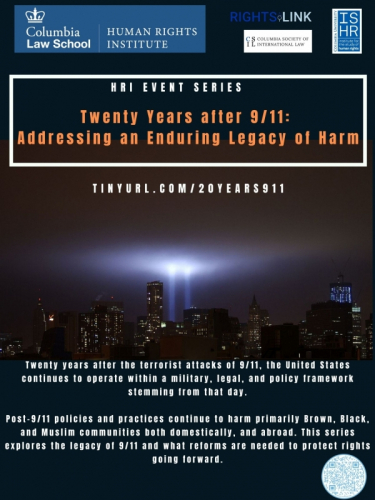
Twenty Years after 9/11: Addressing an Enduring Legacy of Harm
Twenty years after the terrorist attacks of 9/11, the United States continues to operate within a military, legal, and policy framework stemming from that day. Over two decades, the U.S. responded through a range of abusive practices, from the use of torture and secret detention, to extraordinary rendition, to a secretive and unaccountable program of lethal strikes, to indefinite detention at Guantanamo Bay, to domestic surveillance. Post-9/11 policies and practices continue to harm primarily Brown, Black, and Muslim communities both domestically, and abroad.
This series explores the legacy of 9/11 and what policies and reforms are needed to protect rights going forward.
EVENTS
Understanding the Costs of Post-9/11 Wars (Watch the recording)
Thursday, April 21 | 12:10 - 1:10 pm EST
The U.S. has never fully reckoned with the civilian cost of its post-9/11 wars. Civilian deaths remain unacknowledged, uncounted, and too often ignored—as do the longer-term consequences of these wars. Panelists Stephanie Savell (Costs of War Project), Emran Feroz (Founder of the Drone Memorial and Independent Journalist), Chris Woods (Founder, Airwars), and Bonyan Jamal (Accountability Specialist, Mwatana for Human Rights) will discuss their research shedding light on the human costs of U.S. military operations abroad, and their efforts to address this blind spot in U.S. foreign policy.
After the U.S. Withdrawal from Afghanistan: Protecting Rights and Seeking Accountability (Watch the recording)
Wednesday, April 6 | 12:10-1:10 pm EST
For the past two decades, human rights advocates have called for all perpetrators of human rights abuses in Afghanistan, including U.S. forces, to be held accountable. Now, the collapse of the Afghan government, and Taliban takeover have accelerated a human rights and humanitarian crisis. Panelists Katherine Gallagher (Center for Constitutional Rights), Shaharzad Akbar (Former Chairperson, Afghanistan Independent Human Rights Commission), Horia Mosadiq (Expert, Human Rights and Transitional Justice) and Heather Barr (Human Rights Watch) will discuss obstacles and challenges to seeking accountability, and potential routes for justice going forward.
Addressing a Legacy of Abuse at Guantanamo Bay: Ending Twenty Years of Injustice (Watch the recording)
Wednesday, February 16 | 12:10-1:10 pm EST
More than 20 years ago, the Guantanamo prison facility opened its doors to the first of nearly 800 Muslim men and boys to be held in detention there. Nearly a year ago, President Biden promised to close the facility, ending the practice of indefinite definition there and marking an end to its history of torture and abuse, but his administration has made very little progress toward that end. Guantanamo remains open, with 39 men still detained there, the majority of them never charged. Hear panelists Mansoor Adayfi (writer, artist, activist, and former Guantanamo detainee), Alka Pradhan (CLS ‘07; Human Rights Counsel for Ammar al Baluchi, Guantanamo Bay Military Commissions), and Terry Rockefeller (Founding Member, September 11th Families for Peaceful Tomorrows) discuss the facility’s history of injustice and the pathway to closure. Scott Roehm (Washington Director, Center for Victims of Torture) will moderate.
Post 9/11 Counterterrorism Policy: Secrecy and the Importance of Whistleblower Disclosures (Watch the recording)
Wednesday, September 29 | 12:10- 1:10 pm EST
This event features Jeremy Scahill, a founding editor of the Intercept and award-winning investigative journalist, and Jameel Jaffer, executive director of the Knight First Amendment Institute at Columbia University. Speakers will address how key information provided by whistleblowers informed public understanding and oversight of counterterrorism programs, as well as the risks whistleblowers face. Priyanka Motaparthy, of Columbia Law School’s Human Rights Institute, will moderate.
Civilian Impacts in the Global War on Terror: U.S. Drone Strikes and Counterterrorism Operations in Somalia (Watch the recording)
Thursday, October 7 | 12:10 - 1:10 pm EST
Ten years after the first U.S. drone strike in Somalia, air strikes and counterterrorism operations aimed at al-Shabab continue, in some cases killing or injuring civilians. Panelists Abdullahi Hassan, LLM '22 (Somalia Expert), Brian Finucane (International Crisis Group), Amanda Sperber (Foreign Correspondent), and Abdifatah Hassan Ali (Digital Shelter) will discuss the civilian impacts of these strikes, as well as the legal basis for continued U.S. operations in the country.
EVENT SERIES CO-SPONSORS
- Columbia Society of International Law
- Columbia University Institute for the Study of Human Rights
- RightsLink
Please note that all sessions will be recorded and published, contingent on consent from presenters in each. Attendees should be mindful of this in case their personal information, including possible name, picture, or video appears at any time during any of the recordings.
Columbia University makes every effort to accommodate individuals with disabilities. Please notify us at least 10 days in advance if you require closed captioning, sign-language interpretation or any other disability accommodations. Alternatively, Disability Services can be reached at 212.854.2388 and [email protected].
